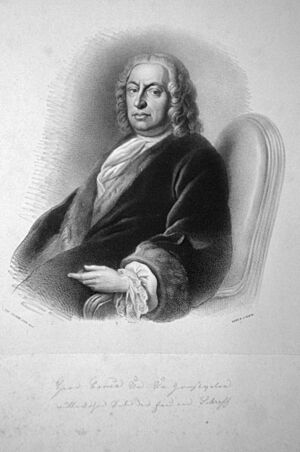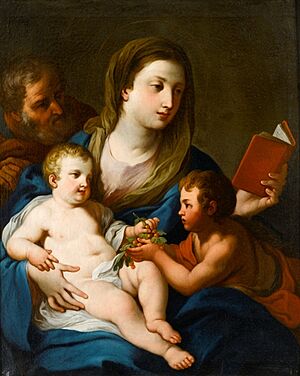Sebastiano Conca facts for kids
Sebastiano Conca (born in Gaeta, Italy, on January 8, 1680 – died in Naples, Italy, on September 1, 1764) was a very famous Italian painter. He lived during a time called the Baroque period, and his art was known all over Europe.
Contents
Life and Career
Early Life and Training
Sebastiano Conca was born in a town called Gaeta, which was then part of the Kingdom of Naples. When he was young, he moved to Naples to learn how to paint. He became a student of a well-known artist named Francesco Solimena.
In 1706, Sebastiano moved to Rome with his brother Giovanni, who helped him with his work. For several years, Sebastiano focused on improving his drawing skills by working only with chalk.
Rise to Fame
Sebastiano Conca became popular with important people. A powerful church leader, Cardinal Ottoboni, helped him meet Pope Clement XI. The Pope was so impressed that he asked Conca to paint a picture of Jeremiah for a big church called St. John Lateran. This painting was very well-liked. He also painted a work called Assunta for another church in Rome, Santi Luca e Martina.
The Pope was so pleased with Conca's work that he made him a knight. Sebastiano also worked with another famous painter, Carlo Maratta, on a painting called Coronation of Santa Cecilia between 1721 and 1724.
Leading Artist and Teacher
In 1718, Sebastiano Conca became a member of the Accademia di San Luca, which was an important art academy in Rome. He even became the director, or "Principe," of the academy several times. This showed how respected he was as an artist.
Many young artists learned from Conca. Some of his famous students included Pompeo Battoni and Corrado Giaquinto. Sebastiano's brother, Giovanni Conca, was also a painter.
Works for Important Families
Sebastiano Conca received many important jobs from powerful families and rulers. He worked for the Savoy family in Turin, painting for places like the Oratory of San Filippo and Santa Teresa and the Basilica di Superga. He also painted frescoes, which are paintings on walls or ceilings, in a hospital in Siena. In Genoa, he created large paintings for the Palazzo Lomellini-Doria.
Later Years and Return to Naples
In 1739, Conca wrote a guide about painting called Ammonimenti, which means "Admonishments." It gave advice on both painting techniques and good behavior.
He moved back to Naples in 1752. There, he continued to paint for the royal family, including King Charles III. He painted frescoes for the Church of Santa Chiara and many other churches and palaces. Sebastiano Conca kept painting until he was very old.
Painting Style
Sebastiano Conca's art was strongly influenced by the Baroque style, especially by the painter Luca Giordano. Baroque art is known for being dramatic, emotional, and full of movement.
Characteristics of His Art
Conca's paintings often showed many figures, including people from myths and classical stories. These scenes were usually very busy and full of action. He often included many small, flying angels called putti. The backgrounds in his paintings often looked like big, swirling clouds.
Sometimes, even in a simple scene, Conca would add extra figures to represent ideas. For example, in a painting about two lovers, he might include a hovering cupid to show the idea of love. His paintings were very detailed and often used a style called Mannerism, which is a later form of Baroque art.
See also
 In Spanish: Sebastiano Conca para niños
In Spanish: Sebastiano Conca para niños
 | George Robert Carruthers |
 | Patricia Bath |
 | Jan Ernst Matzeliger |
 | Alexander Miles |



